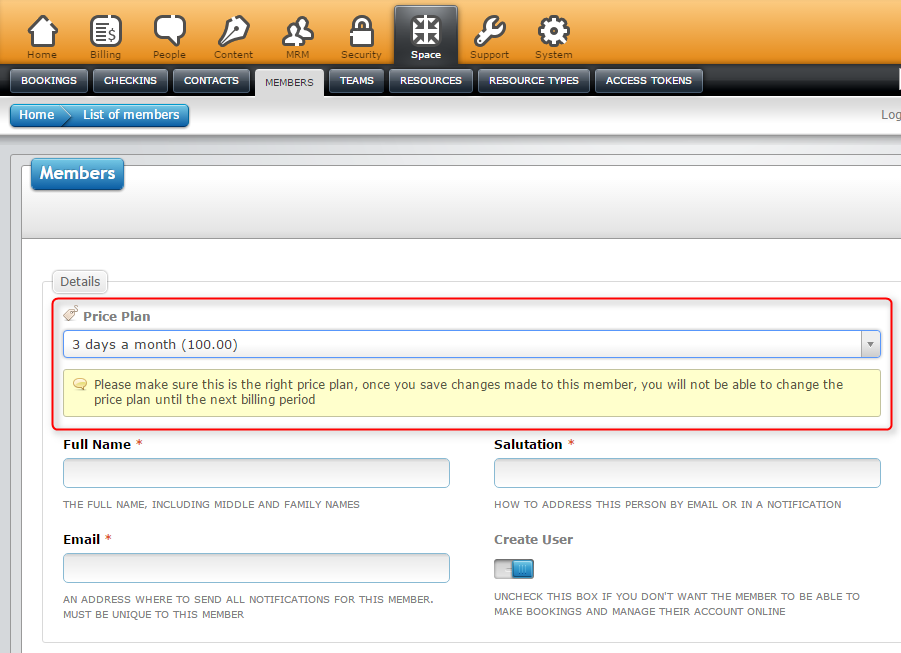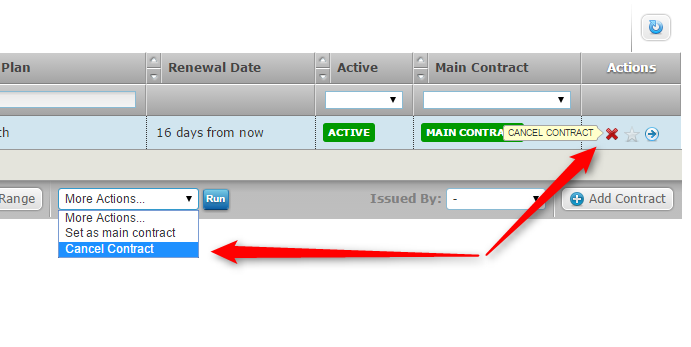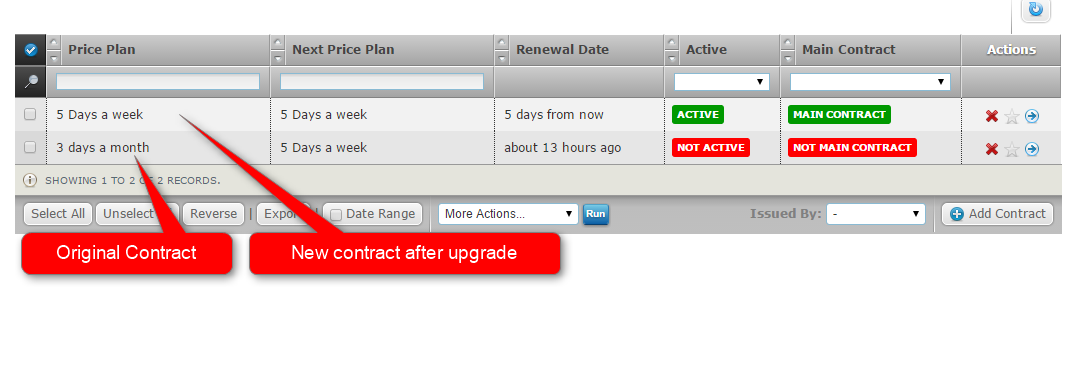Contracts
Nexudus Spaces is notoriously member-centric. Most of the processes you can put through it start and end with a member; a person. This includes bookings, memberships, legal agreements and any purchases, from a locker to a ticket to go to an event. With the time, we have introduced features that let you leap away from the individual and form groups, which we call teams, and charge members in your space for services which may not just be used by themselves, as an individual.
In most instances this works well, each person pays for a single membership, for example a 3 days week hot-desk membership, and may top it up with some add-ons, for example, a secure locker, a parking space or a 24/7 access privilege; which we represent as recurrent products.
Recurrent products were introduced a while ago to allow for this combination of products and services being charged to a single person but they suffer from a well-known problem: they are not treated as a membership. This means that all the information you can get about members signing up, upgrading, downgrading and cancelling their memberships is available only for the membership a person is signed up to, but not for the different add-ons you may sell to them as a recurrent product.
To solve this, we are introducing a new concept: contracts.
Contracts represent agreements between you and a member. A contract is always based on a price plan, which is like a template to define the billing cycle, price and other properties of the contract. A member can have as many contracts as you want, they can each have different billing cycles and start and end at different times.
Each contract has a “status”, it can be inactive, active or cancelled.
Inactive contracts are those with a start date in the future. Contracts will be automatically activated when their “start date” is reached. People with an inactive contract are not regarded as a member until the contract is activated.
Active contracts are running contracts. Their start date is in the past and will invoice members automatically based on the price plan details the contract is for.
Cancelled contracts are those who have reached their cancellation date. A cancelled contract cannot be activated again or changed in any way.
The Main Contract
To make sure you can still use recurrent products, each member can have one (and only one) “main contract”. The main contract is different to other contracts in that it will be the only contract to include any recurrent products or charges set to be added to the main contract.
Adding a Contract
When creating a new member or contact profile from Space > Contacts or Space > Members, you will be asked if that new profile should be linked to a price plan. If you select a price plan, a contract will be created for that price plan and will be activated immediately.

For existing members or contacts, you can add new contracts using the contracts tab in their profile.

Cancelling a Contract
You can cancel a contract at any point by using the “Cancel Contract” item in the “More Actions” menu, the “cross” icon in the list of contracts or the “Cancel Contract” button at the top of the contract details page.

Once a contract has been cancelled, it cannot be activated or changed in any way.
You can also schedule the cancellation of a contract by setting a “Cancellation Date” in the contract. When that date is reached, the contract will be automatically cancelled. If the member has any outstanding charges, an invoice will be created on the cancellation date.
Contract Dates
There are three important dates for each contract: start date, renewal date and cancellation date.
Start Date: The start date indicates when the contract should be activated. If this date is the current date or in the past, the contract will be activated immediately. Inactive contracts will automatically be activated on this date.
Renewal Date: Indicates when this contract should be renewed. Nexudus handles this date for you automatically so, in most cases, you will never need to change it. For new contracts, the renewal date is set to be the same as the Start Date. If this contract is set to change the price plan of the member, this change will happen on this date, when a new contract for the new price plan will be automatically created.
Cancellation Date: Set this date to automatically cancel the contract. If the member has any outstanding charges, an invoice will be created on the cancellation date. Without a cancellation date, contracts renew indefinitely.
Upgrades
The “next price plan” field in each contract lets you schedule a change of price plan ahead of time. The default value for the “next price plan” field is the current “price plan”. If you choose a different plan, the current contract will be cancelled on the date set as the “Renewal Date” and a new contract will automatically start and be invoiced on that date.

Price and Value
By default, the contract takes the price from the price plan it is for. In some occasions you may want to offer a specific price which differs from that of the price plan. To do this you can use the price field.
Keep in mind that, if you set a price for a contract, it will no longer follow the price of the price plan. Even if the price for the price plan is changed, the contract will still have its own price.
The value of the contract is reflected in your upgrades and downgrades reports. It has no financial effect but it will be used to compare relative values of the different price plans. If no value is provided, the value of the contract is assumed to be the price of the price plan.
Using the API?
if you are using the API, the listing of members and contacts will naturally no longer contain a price plan. Each member or contact will have one or more contracts. There is a dedicated enpoint for contacts available here.
The queries parameters for the coworkers endpoint (Coworker_Tariff=notnull) and for contacts (Coworker_Tariff=null) will still work as expected, assuming a member is somone with, at least, one active contract.
Main image source: Olu Eletu
Related stories
Why a CRM is Essential for Coworking Spaces (And How to Choose the Best One)
A customer relationship management platform (CRM for short) is what organisations use to manage relationships and interactions with both existing and potential customers. Its primary function is to streamline operations and communications to ensure a smooth customer - and employee - experience, while improving profitability.
How the Right Coworking Software Can Transform Your Coworking Space
We all know that technology solutions are imperative to the day-to-day running of your coworking space, but the right coworking software can take it to the next level. It has the power to transform your coworking space into a highly profitable business, all while building a vibrant and engaged community. Let’s explore how the right tools can transform your coworking space.
New in Nexudus: Reduce no-shows & improve team bookings in your coworking space.
Meeting rooms are at the heart of collaboration in coworking spaces. Whether it's a brainstorming session, a client meeting, or a team catch-up, having a simple and efficient way to book and manage meeting rooms makes all the difference. But let’s be honest—there’s always room to improve the experience for your members.
Unlock New Revenue Streams with Our New Virtual Offices Module
The popularity of remote and hybrid working has prompted many organisations to rethink the way they utilise office space. Many have swapped their large, static HQs for more flexible satellite solutions that can accommodate a disparate workforce.
ViDA Compliance Guide: 8 Essential Steps for Coworking Spaces in the EU
Now that 2025 has arrived, the European Union's VAT in the Digital Age (ViDA) initiative is becoming a key topic for coworking spaces operating in the EU. But don’t panic—ViDA will be introduced gradually, with key changes taking effect from 2028. This major VAT reform aims to modernize tax reporting, combat fraud, and streamline compliance through mandatory e-invoicing and real-time digital VAT reporting for certain transactions.
Harnessing AI to Help Coworking Operators Understand Their Communities Better
After more than twelve years in the coworking industry, we’ve seen the movement evolve at an incredible pace, especially in recent years. Spaces have grown larger, making it harder for operators to truly connect with their communities. At the same time, expectations for higher service standards and increasing competition mean that creating tailored experiences and fostering long-term member engagement is more important than ever.
What Is Workplace Management and Why Does It Matter?
There has always been a need for workplace management – the process of organising and optimising physical spaces, resources, and operations to support people’s needs. But, as 28% of UK working adults were reported to work in a hybrid capacity last autumn (by the Office for National Statistics), the question of ‘why workplace management matters’ is more critical than ever. Let’s look at the workplace management benefits for your operations.
Exploring Coworking Software in 2025: 10 Key Nexudus Features
From automating daily processes to supporting your team in building a thriving community and boosting revenue for your business – coworking technology couldn’t be more impactful for flexible workspace operations. But with so many tools available, selecting the right tech stack for your coworking business can be overwhelming.
Unlock Your Team’s Potential with the New Nexudus Academy
As the coworking industry continues to grow and evolve, so does the Nexudus platform. We always strive to develop new features and enhance existing ones to make your job easier. When new features are introduced, there is a need to learn how to best leverage them for your space.
From Startup to AI-Powered Coworking Software Company: The Nexudus Journey
When we first launched Nexudus, we were a small, tightly-knit team wearing multiple hats—from sales to implementation and customer support. In those early days, if a customer had a question, there was a good chance that the person answering it was also the one who had built that particular feature.

